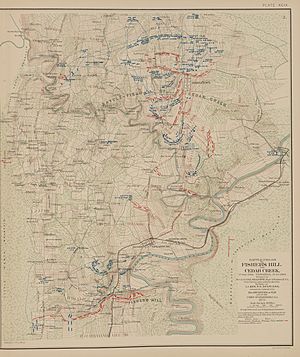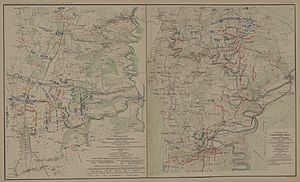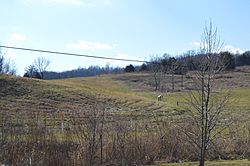Battle of Fisher's Hill facts for kids
Quick facts for kids Battle of Fisher's Hill |
|||||||
|---|---|---|---|---|---|---|---|
| Part of the American Civil War | |||||||
 Battlefields of Fisher's Hill and Cedar Creek, VA |
|||||||
|
|||||||
| Belligerents | |||||||
| Commanders and leaders | |||||||
| Philip H. Sheridan | Jubal Early | ||||||
| Units involved | |||||||
| Army of the Shenandoah | Army of the Valley | ||||||
| Strength | |||||||
| ~35,000 ("present for duty") 29,444 (engaged) |
9,500 | ||||||
| Casualties and losses | |||||||
| 528 | 1,234 | ||||||
The Battle of Fisher's Hill was fought September 21–22, 1864, near Strasburg, Virginia, as part of the Valley Campaigns of 1864 during the American Civil War. Despite its strong defensive position, the Confederate army of Lt. Gen. Jubal Early was defeated by the Union Army of the Shenandoah, commanded by Maj. Gen. Philip Sheridan.
Contents
Background
Military situation
Sheridan had almost 35,000 men in the Shenandoah Valley opposing Early, with just under 10,000. Early, following the Third Battle of Winchester took a strong position. His right rested on the North Branch of the Shenandoah River. The left flank of his infantry was on Fisher's Hill. Confederate cavalry was expected to hold the ground from there to Little North Mountain. Maj. Gen. George Crook advised Sheridan to flank this position. His command was assigned to move along the wooded slopes of the mountain to attack the cavalry.
Opposing forces
Union
Confederate
Battle

Crook's attack began about 4 p.m. on September 22, 1864. The infantry attack pushed the Confederate troopers out of their way. Maj. Gen. Stephen Dodson Ramseur tried refusing the left flank of his division. Crook and Brig. Gen. James B. Ricketts's division, of Horatio G. Wright's VI Corps struck Ramseur's line, pushing it in. Wright's remaining divisions and XIX Corps broke the Southern line.
Aftermath
The Confederates fell back to Waynesboro, Virginia. Brig. Gen. Alfred Torbert was sent into the Luray Valley with 6,000 cavalrymen to force his way through the 1,200 Confederate cavalrymen under Brigadier General Williams Wickham. Torbert was then supposed to move through the New Market and Luray Gap in Massanutten Mountain and come up behind Early and cut-off his retreat at Fisher's Hill. Torbert fell back after making a token effort against Wickham's force at Milford (present day Overall) and Early escaped.
Four Union Army enlisted men and one officer received the Medal of Honor in the action at Fisher's Hill.
- Private James Connors, 43rd New York Infantry
- Private John Creed, 23rd Illinois Infantry
- Private George G. Moore, 11th West Virginia Infantry
- Sergeant Sylvester D. Rhodes, 61st Pennsylvania Infantry
- First Lieutenant Edward N. Whittier, 5th Battery Maine Light Artillery
Battlefield preservation
The Civil War Trust (a division of the American Battlefield Trust) and its partners have acquired and preserved 362 acres (1.46 km2) of the battlefield. The preserved portion of the battlefield is marked by trails and interpretive signs.


